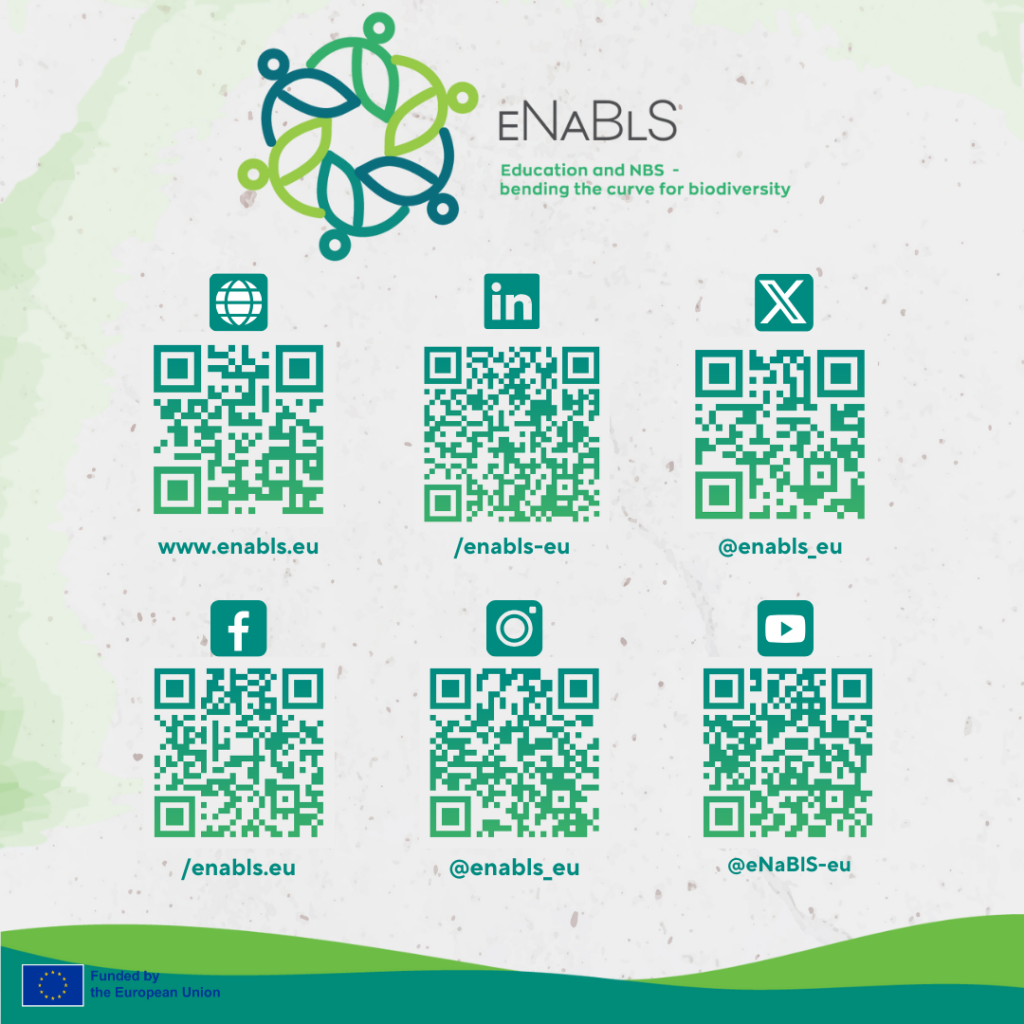As the world grapples with climate change and biodiversity loss, the ᴇNᴀBʟS project is championing a paradigm shift in the content and delivery of education on Nature-based Solutions (NBS). At its core, the project highlights the need for educational systems to embrace nature-based thinking—a framework that situates humanity within ecosystems rather than apart from them. This approach emphasises the mutual benefits of restoring natural systems not only for environmental resilience but also for human well-being, economic stability, and societal progress.
Bridging Ecological and Human/Economic Needs
The ᴇNᴀBʟS initiative underscores that NBS are inherently multidisciplinary, requiring expertise from fields as diverse as environmental science, sociology, governance, and economics. Central to their implementation is the recognition that ecological restoration and resilience-building are not only scientific challenges but also economic imperatives. This necessitates considering the costs and benefits of integrating NBS into higher education and its impact on society.
“Successful NBS hinge on our ability to align ecological goals with human needs and economic realities”
notes the ᴇNᴀBʟS team. This alignment necessitates a rethinking of education to prepare students to work at the intersection of disciplines, translating scientific insights into actionable strategies supported by innovative financial mechanisms. Universities and Technical and Vocational Education and Training (TVET) institutions have a pivotal role to play in this transformation. By integrating concepts such as biodiversity credits, nature-based insurance products, investment strategies, and life cycle assessment into curricula, they can equip students to navigate the complex interplay between natural and human systems. This knowledge empowers graduates not only to secure funding for NBS projects but also to deliver solutions that restore ecosystems while driving economic and social progress.
What sets the ᴇNᴀBʟS approach apart is its anthropocentric lens—acknowledging that nature-based thinking must consider the interconnectedness of human well-being and environmental health. Financial innovations, such as payments for ecosystem services or community-driven green investments, must prioritise social equity by ensuring that benefits reach local communities and are supported by education at all levels, all while addressing global challenges.
This human-centred perspective is especially vital as financial systems evolve to accommodate NBS. Projects that restore ecosystems also mitigate climate risks, protect infrastructure, and create jobs—outcomes that are deeply tied to human prosperity. By fostering this understanding, the ᴇNᴀBʟS project encourages future professionals to champion solutions that are not only ecologically sound but also socially transformative.
Educating for Systems Thinking
The ᴇNᴀBʟS findings reinforce the importance of systems thinking in education. Addressing biodiversity loss and climate adaptation requires viewing nature and society as interdependent systems, where changes in one invariably affect the other. Through interdisciplinary collaboration and engagement with real-life scenarios, students learn to balance ecological objectives with economic and cultural considerations, fostering a holistic approach to problem-solving.
This mindset is also reflected in the project’s analysis of research themes, which span ecosystem restoration, conservation, carbon sequestration, and the circular economy. These fields highlight the need for professionals who can transcend disciplinary silos, integrating technical, social, and financial perspectives to implement NBS that are impactful and sustainable—ecologically, socially, and economically.
Society‘s Role in Driving Change
Recognising the importance of societal buy-in, the ᴇNᴀBʟS project engaged over 1,000 participants in the summer of 2024 to understand perceptions of biodiversity and NBS. Among the respondents, young people emerged as particularly vocal advocates, emphasising the need for education systems to prioritise actionable solutions that address both human and ecological needs. Participants from institutions and companies pointed to a shortage of well-educated professionals with practical expertise in NBS, particularly for addressing biodiversity loss and climate change.
This feedback highlights the necessity of aligning education, economics, and policy to create a cohesive framework for advancing NBS. By equipping students with the tools to think systemically and act collaboratively, the ᴇNᴀBʟS initiative aims to cultivate a generation capable of driving change at local, regional, and global levels.
A Holistic Vision for the Future
The ᴇNᴀBʟS project’s work illuminates the path forward: a vision where nature-based thinking and interdisciplinary education converge with economic considerations to create sustainable solutions for both people and the planet. By bridging ecological science with human-centric systems, the initiative underscores the transformative potential of NBS —not only for landscapes but also for livelihoods.
Stay connected as the project prepares to unveil its comprehensive findings, offering actionable strategies to embed NBS into education, and inspire a future where humanity thrives in harmony with nature. Learn more about ᴇNᴀBʟS on the project website, and stay informed by following its social media channels for the latest updates and progress.

The author
The Education and Nature-Based Solutions: enable Society to bend the curve for biodiversity (ᴇNᴀBʟS) project sets the basis of networking and collaboration to promote transdisciplinary dialogue and further embed NBS concepts and approaches within universities and vocational schools, the professional sphere and society at large.

